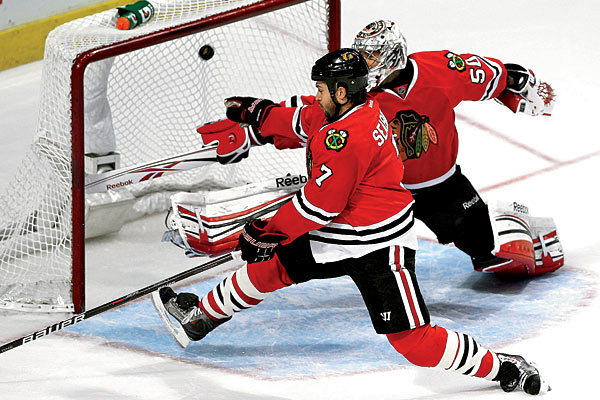Corey Crawford skates out to the middle of the rink and then glides silently back to his own net. All around him, players for the Blackhawks and Canadiens are swirling, shouting, slapping at the puck, sailing across the ice as if on wings, ready to swoop, to attack. But not Crawford. Not the goalie. The goalie stands apart, the loneliest man in all of sport, hidden by his mask and 50 pounds of gear, like a knight guarding a castle with nothing in it.
For two weeks prior to this evening, Crawford had sat quietly at the end of the Blackhawks’ bench, even more isolated than usual, forced to watch another man—his supposed backup, Ray Emery—take his place. The Blackhawks won five of six games with Emery in the goal, and suddenly Crawford didn’t know if he would ever regain his job.
“If you’re a goalie and you don’t think there’s a lot of pressure involved, I don’t think you’re very smart,” says the legendary Blackhawks goaltender Tony Esposito. “Your teammates are relying on you. It’s tough when you cost them a game, and then you start hoping that you don’t do it in the next game. If you do it in two or three games, you’re not playing anymore.”
At the moment in December when Blackhawks coach Joel Quenneville benched Crawford, the Hawks were winning games. But the defense was struggling, especially when it came to penalty killing. Crawford had allowed an alarming 65 goals in 23 games—an average of nearly three per game—and he had not once pitched a shutout. His percentage of saves to goals allowed was among the worst in the league.
If the Hawks offense had not been so terrific, Crawford would have been benched sooner. No way was a team with such a leaky defense going to get far in the playoffs.
When Emery replaced Crawford in December, Quenneville said only that Crawford was “working on his game.” He didn’t say what part of his game, although presumably it was the part in which he was letting pucks get past him.
Emery, whose nickname is Razor, dazzled, and the Hawks won five in a row. But when I spoke with him after a 4–2 win over Calgary, Emery downplayed his importance. “We got a lot of offensive support,” he said. “So it’s not a position where you need to stand on your head to get wins.”
Since undergoing hip surgery in 2010, Emery, 29, has lifted his game. He plays aggressively, fighting through traffic to find the space he needs to see the puck. He’s athletic, and he controls the puck well. Crawford, 27, is the bigger of the two. He moves around less and plays the angles more. He is especially strong against breakaways and shootouts.
I asked Emery whether he and Crawford talked about the controversy over who should play. He said they did but “kept it loose.” Goalies are part of a fraternity, he explained. “It’s a pretty lonely position. There’s a lot of pressure, and it takes a certain kind of personality. We try to keep it light.”
Two games later, Crawford was back in the net, his face and any signs of anxiety hidden beneath his mask. His teammates seemed tentative in the opening minutes, but Crawford stopped seven shots, and the first period ended with no score. In the second period, Montreal broke through when Andrei Kostitsyn redirected a shot for a power-play goal. Crawford waved a left hand but never had a chance. It was a shot no goalie on earth could have stopped. But still, was it the first crack in the façade?
A few minutes later, Crawford looked left and made a routine kick save, but the puck took a funny bounce to his right, where Montreal winger Max Pacioretty found himself firing on a wide-open net. Crawford turned just in time to see Pacioretty. He raised his right arm and batted the puck in midair with his stick, as if swinging a tennis racket. The crowd roared—and then roared again at the replay. After that, the Hawks blew the game open, winning 5–1.
In the locker room after the final buzzer, Crawford smiled like a kid who just won his first youth hockey trophy. “I was a little nervous,” he said. “But I wasn’t holding the stick tight or anything. I was pretty confident.”
I asked him what the six-game benching had done for him. “I don’t know,” he replied. “What do you mean?”
I tried again: Were you working on something particular or just getting your head straight? “I don’t know,” he repeated. “We were winning, and Razor was playing well, and I was just sitting waiting for my chance.”
Was there anything different tonight? “I was a little more focused, a little more ready,” he said. Before the benching, he admitted, “that might have slipped a little bit.”
I pushed, but Crawford didn’t want to go deeper. It’s best not to overanalyze. Hockey can be a brutal, thuggish game, but the goaltender is no thug. He’s a tightrope walker. If he loses his focus, he falls. If he thinks too much about the task at hand, he falls. And he takes the whole team with him. If the Blackhawks are to make something special of their season, Crawford will need to keep his balance. If he doesn’t, maybe Emery will.



